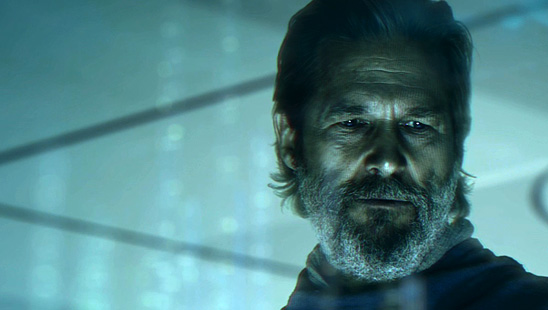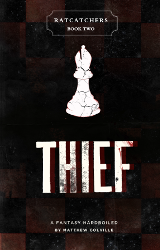
I’m going to say something that may seem obvious to you, or it may be the first time you’ve heard it, or thought about it.
Tron is a movie that imagines the programs we use lead their own little lives behind the computer screen.
If you’ve never seen Tron that statement should give you a clear idea what the movie’s about. It’s the thesis statement of Tron. Not just the movie, the world of Tron. It is my expectation, however, that if you have seen the movie Tron you already know that.
As I talked to people about the sequel, I began to understand something that sorta blew my mind. I don’t think most people familiar with Tron realize that its premise is that the programs we use on computers live their own little lives behind the computer screen. They maybe saw the movie when they were little kids, and so a lot of the dialog just went right over their heads and they never thought about it since. As I mention this complaint to people, the response I get was a sort of head-scratch and “was that in the original movie?” I think what they remember were the visuals and the light cycles and maybe the frisbees and jai-lai. That’s it.
I think the people who made Tron: Legacy were those kids. I think that because no one in this movie, including the people from the first movie, seem aware that the personalties in this electronic world are computer programs. That you could make a Tron sequel that forgets or ignores this, and then that so many people involved in the production and then seeing the film and talking about it, could forget that leads me to conclude that not many people knew it in the first place.
In Tron, there are two kinds of personalties. Programs, and Users. Programs are like people, they live lives inside the computer, and inside the computer they look like the programmers who wrote them. The Users. Us. Real people. The Users are like gods, because they literally create the programs.
But Programs don’t necessarily know that they were written by human beings or that we even exist. That’s not evident to them. Some programs believe it. They believe in the Users, but they never see us, they have no physical evidence of us. They live their lives unaware that their functions they perform, they perform to serve us.
We, the audience, know who they are and what they do because the first movie tells us explicitly.

There’s a character, the Sidekick, basically, in the first movie. A program called RAM. Ram is an actuarial program. He calculates death benefits and annuities. We know this, because he explictly says so. Not only does he say it, he then goes on wistfully to talk about how important actuarial benefits are. He derives great satisfaction from doing his job. That’s not something I made up, it’s in the original movie.
And you think “that’s cute, he really loves calculating death benefits,” and then you laugh. “Of course he does! That’s what he’sprogrammed to do!” Then maybe you laugh again when you realize that real people do that too. There are real people in the real world who derive that same satisfaction from the same job, and that’s a little bit of insight there.
Nothing like that happens in this movie. We never meet a program who does anything. There’s no awareness, no dialog, that this is a movie set inside the network of computers where Programs perform the functions we use every day. How do you make a Tron movie and leave that out? WHY do you make a Tron movie and leave that out? It’s literally the only idea in Tron. There’s some handwaving about how everything we see in this movie takes place inside a mainframe not hooked up to any other network or whatever. Maybe someone thought it was a good idea to come up with a reason why they were ditching the only idea in the original film. 
I believe that, for Disney and their creative team, “Program” means “character from Tronworld,” and nothing else. They believe that if you draw a picture of a normal person, and then color it with neon, you have changed the normal person into a Program, and that’s all there is to it. There’s no other difference. There are no actuarial programs in Tron: Legacy, no chat programs, no web browsers, no word processors, no Apps, no Routers, no nothing. Just lots of people in neon who call themselves Programs.
It would be as The Godfather 2 didn’t have anything to do with the Mafia. No scenes relating to that life, or what they did, or the challenges or choices they faced as a result of it. It would be as if Empire Strikes Back didn’t know what a Jedi was. Or why someone might want to be one, or what the Empire was, or what they did. Imagine those two movies with no mention of those realities, and you begin the understand my puzzlement.
What’s left, when you take the central conceit out a movie like this? Nothing. There’s nothing left because there’s nothing to hang a story on. In spite of this, many people will love it and not care what it’s about, because they never knew what the first movie was about, or didn’t care. And certainly if the first movie failed to get you to care about a character like Ram and what happens to him, this movie will not succeed at that task because there’s no one here to care about.
There’s one human moment, the only one as far as I could detect, where Kevin Flynn meets his son for the first time in 12 years, and shows real emotion. It’s authentic. It was the single time in the film any of the actors were given anything to do. And when you give Jeff Bridges that opportunity, he’s going to knock it out of the park. But otherwise, there wasn’t anything for him to do except occasionally channel The Dude in some nice moments of levity that felt, nonetheless, out of character for the computer whiz kid from the first movie.
The movie is also relentlessly white and relentlessly male. It was produced by three white guys, it was directed by a white guy, it was written by two white guys based on a story by four white guys, the two leads are white guys, the bad guys are all white guys, the music was done by two white guys and the cinematographer was a white guy.

Olivia Wilde is in this and I think there’s one evil henchman who’s female and has as many as five lines of dialog, but even Olivia Wilde has hardly anything to say other than “Look out!” and “We have to stop them!” The kind of dialog you don’t need dialog for, and that made silent movies work. She has no other function in the movie, she’s just something pretty to look at and motivate our hero. She’s the prize he’s after. If he succeeds, he gets her and they ride off into the sunrise.
I bring this up because I feel like it says a lot about what the creators feel the fantasy of Tron is. The main character is a 20-something, good looking, fit, rich white kid who could if he wanted take over his father’s huge megacorporation and be Rich and Powerful, but he’d rather bum around for a while. “Sure,” the movie says, “you’re a white, male, middle-class, faceless shmoe, but that’s just because you haven’t been properly motivated. You could be a rich white male billionaire, you just want to brood a while first.”
We’ve have an awful lot of that recently haven’t we? Bruce Wayne, Tony Stark. It has been said, by smarter people than I (though you may disagree) that the reason James Bond became popular enough in print to make it worth turning him into a movie, was that he presented the English with a fantasy for their Dying Empire. “Remember,” Bond asks, “when we were relevant? When we were in charge and could do whatever we wanted? Remember the world your grandparents talked about? Wouldn’t it be great if all that were still true?”
It seems like Hollywood thinks that’s where we are now. I don’t mind the decline in American power abroad, I think it’s probably healthy, I mind the notion that we should be idolizing rich douchebags and fantasizing about a time when all that mattered was what The White Dude wanted and what The White Dude did. Some of my favorite movies have no women in them at all! But that’s not part of the fantasy they’re selling! It wasn’t Lawrence of Arabia’s fault that Prince Feisal wasn’t Princess Feisal.
People laud the visuals, but I got pretty bored pretty fast. If you’ve seen any fie minutes of Tron: Legacy, you’ve seen the entire movie. It rushes to get us into the…it’s not really a virtual world, it’s apparently a real world, but like an alternate universe. It wants to zip past the character building stuff where you do all the work to get the audience to give a shit about what’s happening, and dump the kid into the Tron-world and show off the visuals. The visuals are neat, but I don’t think they make a movie.
Avatar, a movie that was all visual, showed you all sorts of amazing things. There were sequences in Avatar I just wanted to watch for an hour. As long as no one spoke. It was a terrible movie, one of the worst screenplays I’ve seen recently, but proof that you could have a triumphant film with nothing but visuals.
That depresses me a little because the one thing Tron had was art. Maybe that was all it had. But it was a colossal triumph of art over commerce. The guys who made Tron weren’t writers or directors. They weren’t filmmakers of any sort, they’d never made a movie before. They were all artists. They were animators. The longest thing they’d made before Tron was a series of commercial-length animated shorts for the Olympics.
Those guys had a vision. That’s all they had, and they somehow managed to trick Disney into letting them take that vision and turn it into a summer blockbuster. Spend millions of dollars on it. Tron was made using an animation technique these guys invented. No one had ever done it before, no one would ever do it again.
The story of how Tron was made, is amazing. You can watch it here. Bunch of animators from Boston decide to put on a show, and they do it. Tron: Legacy is 100% the result of some guys at Disney deciding there’s some money to be made off those old properties kids grew up with. There’s 0 artistry here.
At one point in the movie, someone–perhaps Tron–says “I fight for the Users.” When I heard that line, I was depressed. “Ahhh…poor Steven Lisberger,” I thought. “You had vision and guts and you took your team of animators from Boston and based on nothing but an idea and determination you got Disney to let you direct a movie based on your unique vision and, 30 years later…this is what they did with it.”
I spent most of this review explaining the basic assumption of the first movie. I can hear people reading this review saying “what’s he going on about? Who cares about all that?” Well, I don’t care. I didn’t think Tron was a good movie, I thought it was pretty, but otherwise crap. It had some good bits. There was some good dialog to quote and I feel like that’s hard to achieve, writing-wise, so credit there. I honestly didn’t think I’d be writing a review explaining who the characters in Tron are, but that’s how…bad? How..weird this movie is.
I have seen the discussions and I think I know what’s happening. To most people, the absence of those story elements, the idea of Programs, wasn’t important to Tron. What was important? Light cycles and discs and neon. Those people will probably like this movie.

 My first novel
My first novel My new novel.
My new novel.